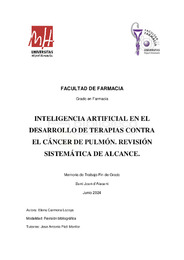Please use this identifier to cite or link to this item:
https://hdl.handle.net/11000/32638Full metadata record
| DC Field | Value | Language |
|---|---|---|
| dc.contributor.advisor | Picó Monllor, José Antonio | - |
| dc.contributor.author | Carmona Lozoya, Elena | - |
| dc.contributor.other | Departamentos de la UMH::Farmacología, Pediatría y Química Orgánica | es_ES |
| dc.date.accessioned | 2024-07-23T10:18:46Z | - |
| dc.date.available | 2024-07-23T10:18:46Z | - |
| dc.date.created | 2024-05-22 | - |
| dc.identifier.uri | https://hdl.handle.net/11000/32638 | - |
| dc.description.abstract | Antecedentes: La inteligencia artificial (IA) ha revolucionado significativamente la sociedad contemporánea, su influencia abarca una gran variedad de campos, y la investigación clínica no es una excepción, así como, el diseño y descubrimiento de nuevos fármacos. El cáncer de pulmón es considerado uno de los cánceres con mayor morbi-mortalidad y el empleo de la IA proporciona un nuevo enfoque para abarcar las dificultades que presenta el tratamiento a nivel farmacológico de esta enfermedad. Objetivo: El objetivo de esta revisión es conocer los conceptos básicos del funcionamiento de la inteligencia artificial y sus aplicaciones en el desarrollo terapéutico y el tratamiento del cáncer de pulmón. Métodos: Se recuperaron 130 referencias de diferentes bases de datos, de las cuales se seleccionaron 12 artículos para un análisis más profundo. Conclusión: Los modelos de aprendizaje automático utilizados en los estudios han demostrado ser eficaces en sus predicciones, aunque todos ellos señalan la importancia de validar estos hallazgos en estudios posteriores. | es_ES |
| dc.description.abstract | Background: Artificial intelligence (AI) has significantly revolutionized contemporary society, extending its influence across a wide variety of fields, including clinical research and the design and discovery of new drugs. Lung cancer is considere one of the neoplasms with the highest morbidity and mortality rates, and the use of AI provides a new approach to addressing the challenges presented by the pharmacological treatment of this disesase. Objective: The main objective of this review is to understand the basic concepts of how artificial intelligence Works and its applications in the therapeutic development and treatment of lung cáncer. Methods: 130 references were retrieved from several databases, out of which 12 articles were selected for a more rigorous understanding. Conclusion: The machine learning models used in the studies have proven to be effective in their predictions, although all of them highlight the importance of validating these findings in subsequent studies. | es_ES |
| dc.format | application/pdf | es_ES |
| dc.format.extent | 33 | es_ES |
| dc.language.iso | spa | es_ES |
| dc.publisher | Universidad Miguel Hernández | es_ES |
| dc.rights | info:eu-repo/semantics/openAccess | es_ES |
| dc.rights | Attribution-NonCommercial-NoDerivatives 4.0 Internacional | * |
| dc.rights.uri | http://creativecommons.org/licenses/by-nc-nd/4.0/ | * |
| dc.subject | inteligencia artificial | es_ES |
| dc.subject | cáncer de pulmón | es_ES |
| dc.subject | desarrollo de fármacos | es_ES |
| dc.subject | aprendizaje automático | es_ES |
| dc.subject | cáncer de pulmón de células no microcíticas | es_ES |
| dc.subject.other | CDU::6 - Ciencias aplicadas::61 - Medicina::615 - Farmacología. Terapéutica. Toxicología. Radiología | es_ES |
| dc.title | Inteligencia artificial en el desarrollo de terapias contra el cáncer de pulmón. Revisión sistemática de alcance | es_ES |
| dc.type | info:eu-repo/semantics/bachelorThesis | es_ES |

View/Open:
Carmona Lozoya, Elena.pdf
845,92 kB
Adobe PDF
Share:
.png)
